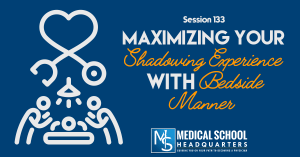
After my interview with Joel last week on MSHQ Episode 132, Joel sent me a message on Twitter and was talking about shadowing and premeds that led to a discussion with Allison about shadowing, premeds, and being a physician about bedside manner and how to maximize that to build rapport with a patient.
So in this episode, Ryan and Allison talk about some ideas on how to maximize your bedside manner and rapport to be a great premed as you’re shadowing, be a great medical student, and be a great physician for patients in the future. And wherever you are at this point, you can start honing that now.
What is bedside manner?
Why is this important?
What are ways of improving bedside manner and communication for those who are shadowing, premeds, med students, or physicians?
Wearing scrubs as not professional: In the medical culture, it’s appropriate. But still carry yourself in a professional way no matter what you’re wearing.
A game you can do to mentally prepare yourself for this: Every doorway that you walk through, take a second and stand up tall. Hold your shoulder blades back. Put your head up and put a smile on your face.
It depends on how well and how long you’ve known this patient. Read the situation and be thoughtful about it. It’s okay to cry but not be crying to the point of hyperventilating.
Sitting on the bed to get to the level of the patient. Eye contact is important. Using the computer by the bedside loses face-to-face communication.
Start practicing bedside manner with everybody you interact with. Start doing it now.

Lorem ipsum dolor sit amet, consectetur adipiscing elit
I just received my admission to XXXXX! This is unreal and almost feels like I am dreaming. I want to thank you for all of your help with my application. I cannot overstate how influential your guidance and insight have been with this result and I am eternally grateful for your support!
IM SO HAPPY!!!! THANK YOU SO MUCH FOR ALL YOUR HELP, IM INDEBTED TO YOU! Truly, thank you so much for all your help. Thank you doesnt do enough.
I want to take a few moments and thank you for all of your very instructive, kind and consistent feedback and support through my applications and it is your wishes, feedback, and most importantly your blessings that have landed me the acceptance!
I got into XXXXX this morning!!!! It still has not hit me that I will be a doctor now!! Thank you for all your help, your words and motivation have brought me to this point.
I wanted to once again express my heartfelt gratitude for your help in providing feedback during my secondary applications. Your guidance has been instrumental in my journey.
Just wanted to share my wonderful news! I received my first medical school acceptance! Thank you for all that you do for us Application Academy!!!
I am excited to tell you that I just got my third interview invite from XXXXX today! I can’t believe it. I didn’t even know if I was good enough to get one, let alone three – by mid-September. Thank you so much for all of your help and support up to this point; I would not be in this position without it!!
I wanted to thank you for helping me prepare for my XXXXX interview. Even in a 30-minute advising session, I learned so much from you. Thank you for believing in me, and here’s to another potential success story from one of your advisees!
I just received an acceptance with XXXXX! This is so exciting and such a huge relief and so nice to have one of our top choice schools! I also received an interview with XXXXX which brings the total up to 20 interviews! Thank so much, none of this would have been possible without you!

Join our newsletter to stay up to date
* By subscribing you agree to with our Privacy Policy and provide consent to receive updates from our company.
Resources
Advising Services
Podcasts & Youtube
Books
About
"*" indicates required fields